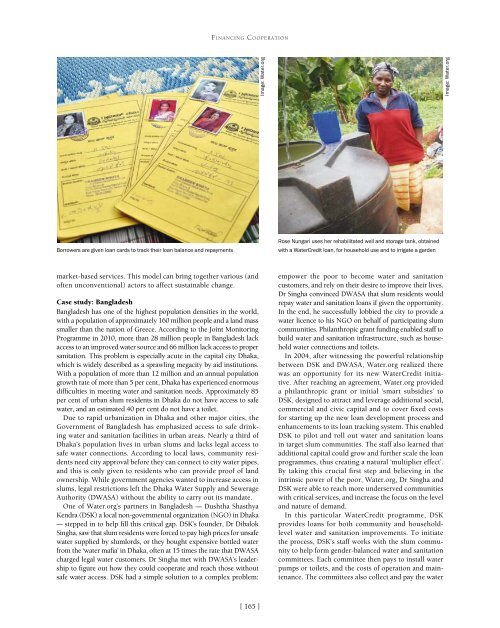222893e
222893e
222893e
You also want an ePaper? Increase the reach of your titles
YUMPU automatically turns print PDFs into web optimized ePapers that Google loves.
FINANCING COOPERATIONImage: Water.orgImage: Water.orgBorrowers are given loan cards to track their loan balance and repaymentsRose Nungari uses her rehabilitated well and storage tank, obtainedwith a WaterCredit loan, for household use and to irrigate a gardenmarket-based services. This model can bring together various (andoften unconventional) actors to affect sustainable change.Case study: BangladeshBangladesh has one of the highest population densities in the world,with a population of approximately 160 million people and a land masssmaller than the nation of Greece. According to the Joint MonitoringProgramme in 2010, more than 28 million people in Bangladesh lackaccess to an improved water source and 66 million lack access to propersanitation. This problem is especially acute in the capital city Dhaka,which is widely described as a sprawling megacity by aid institutions.With a population of more than 12 million and an annual populationgrowth rate of more than 5 per cent, Dhaka has experienced enormousdifficulties in meeting water and sanitation needs. Approximately 85per cent of urban slum residents in Dhaka do not have access to safewater, and an estimated 40 per cent do not have a toilet.Due to rapid urbanization in Dhaka and other major cities, theGovernment of Bangladesh has emphasized access to safe drinkingwater and sanitation facilities in urban areas. Nearly a third ofDhaka’s population lives in urban slums and lacks legal access tosafe water connections. According to local laws, community residentsneed city approval before they can connect to city water pipes,and this is only given to residents who can provide proof of landownership. While government agencies wanted to increase access inslums, legal restrictions left the Dhaka Water Supply and SewerageAuthority (DWASA) without the ability to carry out its mandate.One of Water.org’s partners in Bangladesh – Dushtha ShasthyaKendra (DSK) a local non-governmental organization (NGO) in Dhaka– stepped in to help fill this critical gap. DSK’s founder, Dr DibalokSingha, saw that slum residents were forced to pay high prices for unsafewater supplied by slumlords, or they bought expensive bottled waterfrom the ‘water mafia’ in Dhaka, often at 15 times the rate that DWASAcharged legal water customers. Dr Singha met with DWASA’s leadershipto figure out how they could cooperate and reach those withoutsafe water access. DSK had a simple solution to a complex problem:empower the poor to become water and sanitationcustomers, and rely on their desire to improve their lives.Dr Singha convinced DWASA that slum residents wouldrepay water and sanitation loans if given the opportunity.In the end, he successfully lobbied the city to provide awater licence to his NGO on behalf of participating slumcommunities. Philanthropic grant funding enabled staff tobuild water and sanitation infrastructure, such as householdwater connections and toilets.In 2004, after witnessing the powerful relationshipbetween DSK and DWASA, Water.org realized therewas an opportunity for its new WaterCredit initiative.After reaching an agreement, Water.org provideda philanthropic grant or initial ‘smart subsidies’ toDSK, designed to attract and leverage additional social,commercial and civic capital and to cover fixed costsfor starting up the new loan development process andenhancements to its loan tracking system. This enabledDSK to pilot and roll out water and sanitation loansin target slum communities. The staff also learned thatadditional capital could grow and further scale the loanprogrammes, thus creating a natural ‘multiplier effect’.By taking this crucial first step and believing in theintrinsic power of the poor, Water.org, Dr Singha andDSK were able to reach more underserved communitieswith critical services, and increase the focus on the leveland nature of demand.In this particular WaterCredit programme, DSKprovides loans for both community and householdlevelwater and sanitation improvements. To initiatethe process, DSK’s staff works with the slum communityto help form gender-balanced water and sanitationcommittees. Each committee then pays to install waterpumps or toilets, and the costs of operation and maintenance.The committees also collect and pay the water[ 165 ]


